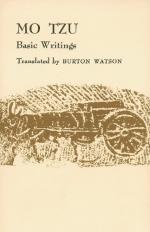|
This section contains 923 words (approx. 4 pages at 300 words per page) |

|
Mozi, also called Mo Di, was the founder of one of the classical systems of Chinese philosophy, Mohism, as well as of a religious community. After serving for a brief period as a civil servant, Mozi spent a number of years as a traveling counselor to feudal lords and princes, and, having never been given the opportunity to put his teachings into practice or the world in order, he had eventually to be contented with conducting a school and preparing his disciples for public office. He left a work consisting of seventy-one chapters, known as The Mozi. It is said that Mozi was at first a follower of Confucianism but later renounced it to found a system of thought of his own. He was critical of Confucianism for its emphasis on the codes of rituals and social elegance, which were...
|
This section contains 923 words (approx. 4 pages at 300 words per page) |

|


